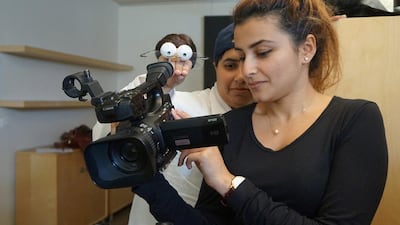An aspiring Emirati film director spent her summer in Paris learning about the art of making movies at the most rewarded film school in the world. Khuloud Al Ali, 34, a graphic designer for Dubai TV, was joined by three Kuwaitis, one Bahraini and two Qataris for an intensive five-week series of classes at La Fémis film school, last month.
She came back to the UAE with what she says were tantalising insights into the process of directing, scriptwriting and producing.
The classes were the result of a collaboration between the French Embassy and oil company Total. They were conducted by renowned French film directors Thierry Boscheron and Laurence Ferreira Barbosa, among others.
“Meeting people working in the film industry was an eye-opener for us, to see how the industry really works – from directing actors to how to meet the cast”, says Al Ali. “It was an intense glimpse of everything.”
Al Ali, from Sharjah, was not a complete beginner to filmmaking. After graduating as an architect and realising it wasn’t the right career for her, she spent a year at Cartoon Network’s Animation Academy at twofour54 in Abu Dhabi and realised animated comedy was her real passion.
When the Gulf filmmakers were tasked with making a short fiction film at La Fémis, and given a choice of scripts to adapt, it was no surprise that Al Ali chose to draw on her skills as an animator to give her chosen script a twist.
“The script I chose was about a man who visits his doctor for a certificate to prove his health, in order to join a horseriding club,” she says. “On finding out that he is not in good shape, he leaves the office upset that he didn’t get his certificate.”
In Al Ali's version, titled Dr Hand, the patient, played by French comedy actress Sandrine Le Berre, is seen by a doctor who is actually a hand puppet, complete with comedy glasses. The completed six-minute film was screened in the presence of Jack Lang, president of the Arab World Institute.
“Everyone had their own contribution about what the message of my film was”, says Al Ali. “For me, I’m just experimenting.
“The course was more about the artistic side of filmmaking than the technicalities, which you can learn anywhere. To be artistic, you need to explore and experiment. They introduced us to what is possible – and it’s our job to explore that.”
Al Ali has made two pilot episodes for animated TV shows in the UAE, and is looking for backing to produce them.
The budding filmmaker is also applying her comedy talents to an animated show, with an Emirati cultural twist, on the Cartoon Network, as one of the scriptwriters.
“I will take care of the Emirati dialogue,” she says. “I’m going to add a sense of humour that can be applied in our region.”
Dr Hand, meanwhile, is available to watch on YouTube, and will be screened by Total at their booth at the Abu Dhabi International Petroleum Exhibition and Conference next month.
“Being a France-based company, we have to close the gap between the cultures,” says Sultan Al Hajji, vice president of Total UAE about the reasons for the company sponsoring the second Gulf summer school.
“Dubai and Abu Dhabi are becoming a hub for filmmaking. We can develop the systems and infrastructure, but when you have people like Khuloud going to France, this is where the transfer of know-how really happens. In 10 years time we will have an abundance of people who are bringing in new ideas and reviving the heritage.
“Filmmakers like Khuloud are reviving the past but in a way that the young generation can understand.”
Al Ali says the networking opportunities the summer school offered her were the most crucial aspect of her time in Paris.
“Getting to know people from the industry was invaluable,” she says. “Some people there told me they would help me with script development, so I hope to go visit and work with them in the future.”
The Gulf Filmmakers’ Summer Schools in Paris are organised by the regional audiovisual attaché at the French Ministry of Foreign Affairs, Mohamed Bendjebbour, who plans to broaden training opportunities for local filmmakers.
“We’re creating a programme of scriptwriting workshops for Gulf filmmakers throughout the year,” he says. “Five of these will take place in Paris and there will be others in Gulf countries – firstly in the UAE. The goal is to select participants and announce the list during the Cannes Film Festival in May.”
The French Embassy has also invited Al Ali to make a one-minute film to be shown at COP 21, the world environment summit in December in Paris.
“Cinema is one of the best ways to preserve heritage and promote the culture of the emirates,” says Michel Miraillet, the Ambassador of France to the UAE.
“Emirati cinema is at a critical stage. It is emerging with multiple talents and needs to be supported and structured.
“As the only foreign embassy in the UAE to have an office wholly dedicated to cinema, television and the digital sectors, it was natural to allow young aspiring gulf filmmakers to learn cinema ‘the French way’.”
• With additional reporting by Chris Newbould
artslife@thenational.ae

